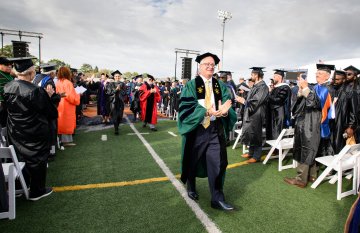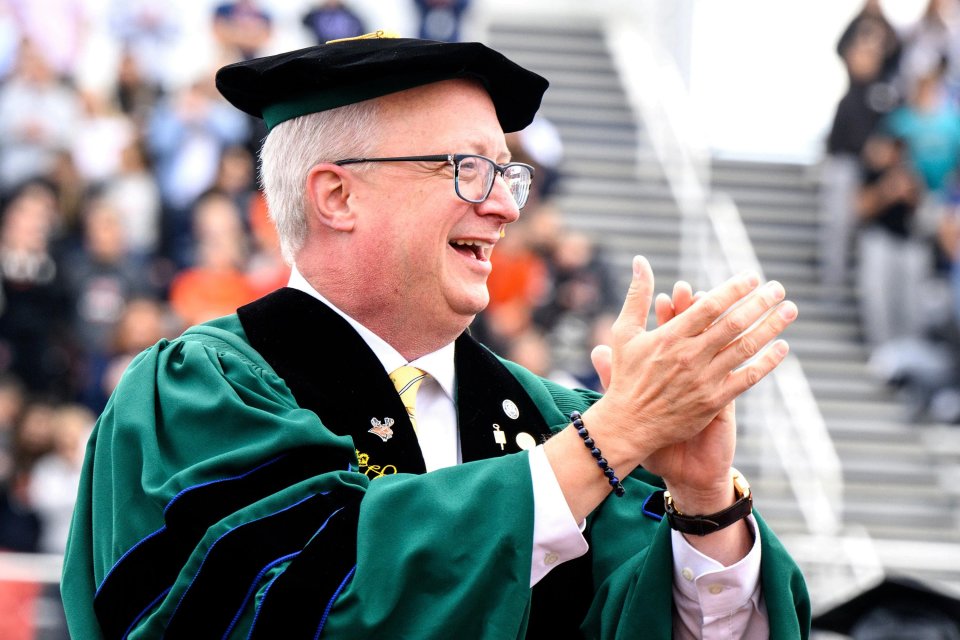
How Todd Pfannestiel he was a natural-born Pioneer

“For me, that’s the adrenaline rush – that same spark that fired in my head when I was in front of a classroom, seeing the light come on for a student. Every time we achieve success, that spark fires again."
The epiphany came as they almost always do – suddenly and without warning.
Todd Pfannestiel was completing his doctorate at the College of William and Mary when the institution offered him the opportunity to do something new and different: teach an undergraduate history course.
Teaching had never been part of his career plan. His driving ambition as a young elementary school student back in Oklahoma, and later as a prolific high school debater, was to enter politics, or even to become President of the United States. Then, after experiencing university life, he was certain that lifelong learner was the role he was best suited for. But by the end of his first 50 minutes as an adjunct history instructor, he knew he had found his holy grail.
“Being a college teacher was an absolute addiction for me, and I loved every minute of it,” he recalls.
It was the start of a new chapter for him. Doctorate in hand, he joined the faculty at Clarion University, and within 15 years he had achieved every milestone that defines a successful professor, from positive teaching evaluations to publications to awards for excellence.
“I was named the Outstanding Faculty Member by the alumni association, which was typically awarded to professors who are much further along in their careers, not at the beginning,” he says. He was also named Outstanding Faculty Member by the Student Athletes Advisory Committee as well as the Student Government Association. “My mentality has always been if you’re going to do something, go the whole nine yards. It’s probably a measure of obsessive compulsiveness that I’ve never been diagnosed with – I am not compulsive, but I am obsessive. That’s why I when I became a professor, I knew I would be college president someday.”
He could have continued along the same professorial path quite happily for another 15 years, but he craved a challenge. As deeply satisfying as teaching was for him, he began to wonder how he could have the same kind of impact on a far greater number of students.
“I wanted to be the best that I could be at whatever I was doing, and I felt that I was reaching that as a professor,” he says. “I found myself asking, what’s next?”
Choosing Utica

Over the next five years, Dr. Todd, as he is colloquially known, served as dean at Clarion, then provost, and for a time, interim president. He had, in fact, already submitted his application for the presidency there when he was offered the provost role at Utica University. “President (Laura) Casamento offered me the job at Utica, so I withdrew my application from Clarion and accepted,” he says.
Relocating and starting fresh wasn’t an obvious choice. He valued loyalty and was reluctant to upend the life and career he had built at Clarion, but his overriding desire to find new opportunities for progress and meaningful change at an institutional level made Utica seem like the right choice at the right time.
“There was a distinct opportunity for me to become Clarion’s president, but I can honestly say that I had reached the one moment in my professional life when I truly felt a change was going to be good for me personally, no matter how scary it might be,” he says. “And when I came up here and met the people, I knew if I was going to make a change and go anywhere, it was going to be Utica.”
Utica felt like home to him. It embodied the same passion for teaching that had taken hold of him from his first moment at the front of that classroom at William and Mary. It had a laser focus on student achievement that resonated with him deeply. Just as importantly, it was founded on a principle of continual improvement and a mission-driven spirit of innovation that was unique in his experience.
If you do not like that phone ringing and not knowing who it’s going to be or what challenge is going to be unexpectedly dropped into your lap, you had better not be a university president
“I absolutely believe in the potential and future of Utica because this is an institution that embraces change, which is extremely rare in higher education,” he says. “No matter how hard the discussion is, at the end of the day we will face challenges head on and make changes if it’s right decision to do so. This is an institution that wants always to be better in terms of how we serve students. That’s where I want to be. If I were at an institution that thought it had it all figured out, I’d probably be a little bored.”
Thriving on the unexpected
When he was chosen as Utica’s next president and the announcement ran in his hometown newspaper in Sapulpa, OK, Pfannestiel saw a social media comment by a high school friend he hadn’t spoken with in more than 30 years.
“He always said he wanted to be president,” his old friend quipped. “I guess in some ways he made it.”
Though it was meant as a joke, there was some truth to his former classmate’s post. The presidency Pfannestiel ultimately was chosen for is perhaps uniquely well-suited to a person of his abilities and general outlook.
As a leader, he thrives on having the opportunity to address often unanticipated challenges, likening it to an addiction.
“If you do not like that phone ringing and not knowing who it’s going to be or what challenge is going to be unexpectedly dropped into your lap, you had better not be a university president,” he says. “For me, that’s the adrenaline rush – that same spark that fired in my head when I was in front of a classroom, seeing the light come on for a student. Every time we achieve success, that spark fires again.
“This is why I do this. I do it to keep the University moving forward. I do it for the students, who are the soul of the institution. But I also do it for myself.”

He also gets an enormous charge out of the president’s role as an ambassador and a storyteller.
“If my entire presidency was based around meeting students and supporters of the institution, that would be fine with me. To the alumni and the donors, I can tell the Utica story, because I’m a historian and I love telling a story. And with respect to the students, I love helping them out in much the same way I did as a faculty member,” he says.
When he is no longer president, Dr. Todd wants his last professional occupation to be the same as his first. “The last employment I’ll have before retirement will be teaching in a classroom, because that is the best feeling in the world. I can’t think of a more rewarding profession than being a university professor,” he says.
And when people ask him what he would like to be remembered for, he has a simple answer.
“Absolutely nothing,” he says, modestly but sincerely. “If many people remember a university president by name, it’s just as likely for mistakes they have made, rather than any specific successes. At the end of my tenure, honestly, I would rather people say, ‘Wow, Utica University has really moved forward since 2023. Who was that president guy whose last name I could never pronounce? Forgot him.’”
More Stories

Utica University Faculty and Staff Spread Holiday Cheer at Annual Holiday Dinner
As the fall semester winds down and the holiday season gets underway, Utica University faculty and staff put on their...

Hometown Hero
Walking the shore of Turtle Beach in Sarasota, Florida, Conner Crossley ’ 26 was looking to enjoy some sunshine and...

Mark Kovacs: The ‘Key’ To Success for Many at Utica
University Key Award Re-Named Kovacs Key Award to Honor 35-Year Career
I would like to see logins and resources for:
For a general list of frequently used logins, you can also visit our logins page.
